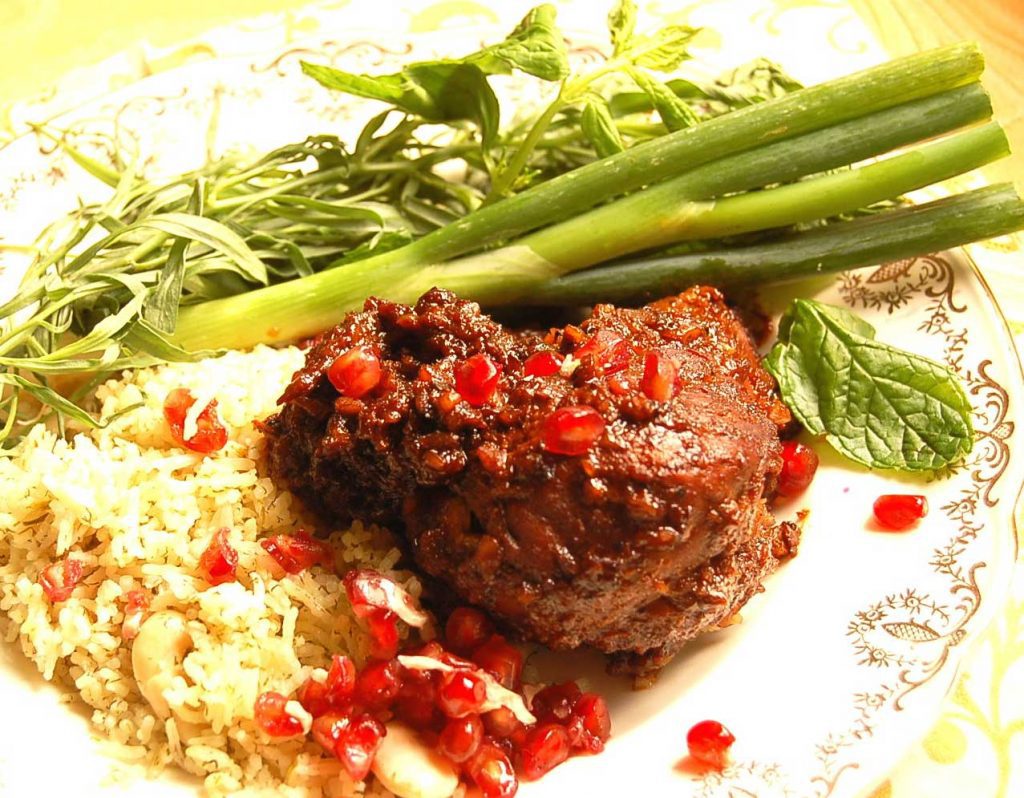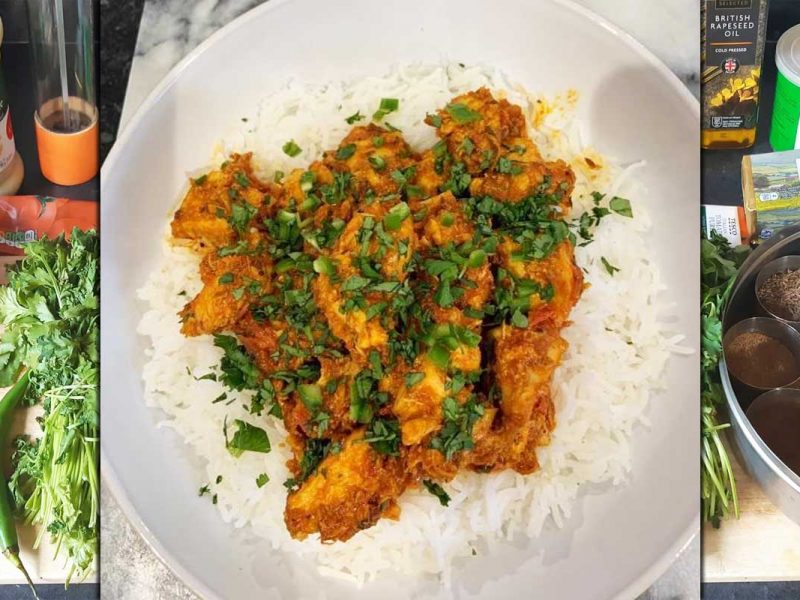Persian Koresh Fesenjan – Karimah Bint Dawood
The Persian Koresh Fesenjan is a sweet sour dish which was first made for me during Ramadhan by a friend’s mum I remember who had come to the UK from Tehran. I fell in love with this dish and many other Persian creations, and the love affair still go on.
A rich chicken stew with walnut and pomegranate syrup, this famous and memorable Persian dish is usually made for festive occasions like Eid.
This is not as difficult as some make out, and my recipe has the seal of approval from the Prince of Persia mashallah! What else can I say – Alhamdulilah!
INGREDIENTS
- 30ml/ ¼ cup /2 tablespoons olive oil1 large onion, finely chopped
- 4 skinless, boneless chicken breast halves
- 115-200grms/ 4-7 oz/ 1-2 cups finely ground walnuts
- 15ml/ 1-2 oz/ 1 tablespoon of tomato puree
- 240-480ml/ 1-2 cups/ 8-16 oz fresh pomegranate juice or pomegranate syrup
- 5ml/ ¼ oz/ 1 tea spoon cinnamon
- 5ml/ ¼ oz/ 1 teaspoon saffron strands
- 5ml/ ¼ oz/ 1 teaspoon cardamon powder
- 2.5ml/ 1/8 oz / ½ teaspoon nutmeg (optional)
METHOD
- Heat the olive oil in a large, heavy deep sided frying pan over medium heat. Cook and quickly brown the chicken on all sides. Remove from pan, and set aside. You can use a whole chicken chopped up or thighs.
- Place the finely chopped onions in the pan and fry till they turn golden translucent, then add the cinnamon, cardamom, saffron and ground walnuts in the remaining oil in the skillet. Cook on medium heat for 5-10minutes to allow the oil to begin releasing from the walnuts.
- Return the chicken to the pan with the onions and walnuts, and blend in the pomegranate syrup.
- Reduce heat to low, cover, and simmer on a very low heat for an hour so that the flavours infuse into the flesh, stirring occasionally would make this dish the day before and leave in the fridge and warm up so that the meat becomes really infused with eh flavours but I am a fesenjun junkie.
Serve with basmati rice, raw spring onions, fresh tarragon on the stems and whole radishes. The sweet flavours of Koresh fesenjunn are balanced by the fresh, sharp flavours of the onions, radish and raw herbs. Please go easy on the onions if you are going to the masjid.
Although the following hadith mention garlic as oppose to onions, onions can be quite strong on the breath if they are eaten raw so a nice handful of fennel seeds eaten on the way to the masjid should do the trick to sweeten your breath and ease your tummy.
I’m a qualified nutritionist who has written an award-winning cookbook. With a degree in fine arts from Central St Martins, I have just created and released a NEW nutritional book: Sacred Sunnah Super Foods – an illustrated guide to Quranic Foods, and published by Karimah’s Cuisina.
Heavenly Bites is the first multinational Muslim cookbook that features the best of Muslim cooking to be found from Morocco to Bangladesh, served up by Karimah bint Dawood, the television presenter and cook and convert to Islam. Featuring fifty recipes for soups, salads, snacks and starters, smoothies, main courses, and sweets, it assembles dishes for all occasions from the international Muslim world. Each recipe is charmingly introduced by Karimah and an index is provided for quick and simple referencing.
With an eclectic Asian, African, Scottish, and English heritage, Karimah bint Dawood is widely traveled and well-versed in global cuisines and cultures. She has worked as a make-up artist for Gucci, Revlon, and Brides magazine, and has traveled and worked as a fashion model around the world, during which time she developed her interest in world cooking. After converting to Islam, Karimah put down her brushes and white stilettos for a while and picked up the henna cone and the Qur’an.
If you have any recipes you want published, Contact Us now. We’d love to hear from you!






